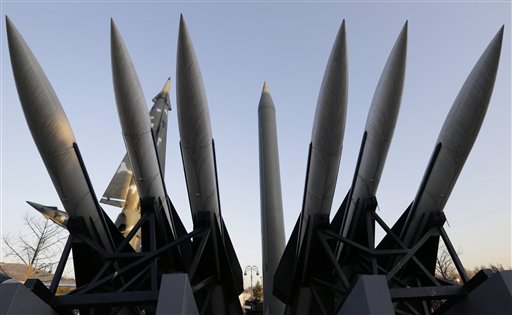Amid China tensions, US plans $1.8B arms sale to Taiwan

In this Dec. 26, 2014 file photo, a North Korea’s mock Scud-B missile, center, stands among South Korean missiles displayed at Korea War Memorial Museum in Seoul, South Korea. After three years of diplomatic deadlock, the Obama administration says it is open to holding preliminary talks with North Korea to see if there’s a prospect of ridding the country of nuclear weapons. AP
WASHINGTON, United States — The Obama administration is planning its first arms sale to Taiwan in four years, congressional aides said Tuesday, a move that typically draws stiff criticism from Beijing but is unlikely to derail U.S.-China relations.
The planned $1.8 billion sale would include two decommissioned U.S. Navy frigates, minesweepers, Stinger missiles, anti-armor and anti-tank missiles and other equipment, one of the aides said. The administration is seeking to expedite preliminary approval from the House and Senate foreign affairs committees for the proposed package so it can formally notify Congress of the sale as early as Wednesday.
The aides who were briefed on the sale requested anonymity because they were not authorized to comment before the formal notification.
In December 2014, Congress passed legislation authorizing the transfer of up to four of the guided-missile frigates to Taiwan, and there’s been mounting bipartisan pressure for the administration to follow through, amid concern Taiwan is inadequately armed to defend itself against an increasingly powerful mainland China.
The administration has announced more than $12 billion in arms sales to Taiwan since 2010, but none since $5.9 billion in sales in September 2011 that included upgrades for Taiwan’s F-16 fighter jets. That drew a diplomatic protest from the authoritarian government in Beijing, which regards Taiwan as part of China. Beijing suspended some military exchanges with the United States, but did not seriously impair ties.
The United States is legally obligated to sell weapons to Taiwan for its self-defense. The four-year hiatus in sales has drawn congressional criticism, with both senior Republicans and Democrats urging the administration to announce a new arms package, even if its risks tensions with China.
“China objects to all U.S. arms sales to Taiwan and will certainly denounce this sale. But in a break from the past, Beijing is not likely to suspend military-to-military exchanges with the U.S.,” said Bonnie Glaser, an expert on China at the Center for Strategic and International Studies think tank. She said the arms package doesn’t contain any advanced weapons, and China has also come to value the military exchanges with the U.S more than in the past.
President Barack Obama has sought greater cooperation with China on issues such as climate change, and the two sides have increased military exchanges to reduce the risk of conflict. But at the same time, relations have been roiled by China’s construction of artificial islands in the South China Sea and allegations of Chinese cybertheft.
Taiwan, however, has weighed less on the U.S.-China relationship, as tensions between Taiwan and the mainland have eased in recent years, notwithstanding the growing gap in military capabilities across the Taiwan Strait.
The proposed U.S. sale comes ahead of Taiwan’s presidential and legislative elections next month. The presidential candidate for the ruling Nationalist party, which has promoted economic ties with Beijing, is forecast to lose by a wide margin to the candidate from the main opposition party, which has traditionally advocated for Taiwanese independence.
David McKeeby, spokesman for the State Department’s bureau of political-military affairs, said Tuesday that as a matter of policy, the department doesn’t comment on proposed defense sales or transfers until Congress has been formally notified.














